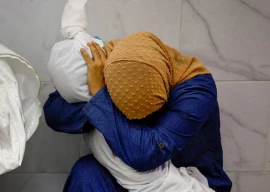
PESHAWAR:
Armed with only a slightly used copy book sent by her aunt from Peshawar, Azeera Gul, 12, is fighting for the rights of girls to education. Although her school in Kabal in the Swat Valley is still in a ramshackle state after being burnt down during the Taliban insurgency in 2008, Gul insists she wants to become a schoolteacher and educate girls in her village.
Gul is not alone in wishing to bring change to her valley. One story that galvanised the international media is that of Malala Yousafzai.
In 2009, she began campaigning from her remote village in Shangla in Swat against the Taliban for the right to education for girls.
She was nominated for the International Children’s Peace Prize for her pioneering efforts to raise awareness on restricted access to education in her homeland. Her nomination brought home the problems of Swat to millions in the country and won her national recognition with an award from the prime minister.
She is not the only young campaigner. “I want to become a doctor,” said Ludia Bibi, 14, from Mingora. “That is the only way I can help people here and make sure women in particular get the care they need.”
Maria Toor Pakai, 19, grew up in South Waziristan, where women rarely venture out of their homes. She defied tradition by playing squash and now she is a top-ranking national player.
“I knew my daughter was different and I wished to encourage her,” said Maria’s father, Shamsul Qayyum Wazir, who took her to Peshawar in 2002, eager to grant her the opportunity she would have been denied at home.
“We had received threats from the Taliban warning us to stop her from playing,” he said.
Today, Pakai lives and trains in Toronto, her story an inspiration for others. “I always think of the hard rocks of my land, and how tough they made me,” she said.
But while these young women have fought back, others find it harder to do so. “I want my daughters to have a better life than I do, but it is hard,” said Ujala Gul, 40, a mother of three girls who lives in a village near Saidu Sharif. “I am afraid they will end up as powerless housewives just like me, subservient to their husbands.”
Even so, the girls seem more determined than boys given the harder struggle that lies ahead for them. “I feel I must do something with my life. Things must change otherwise girls and women will never have enough options,” Samira Ahmed, 12, told IRIN. She is helping to run classes near Kabal for girls who are not able to go to school.
“There are so many little girls here who could change the future. I have educated daughters and I know they can change the family’s destiny. That’s why I want to help all those I can,” said Mullahzai Tauqir, 65, a grandfather and retired teacher who now runs voluntary classes for out-of-school children near Mingora.
“I think my efforts and theirs will one day make a real difference and bring about change.”
Published in The Express Tribune, December 9th, 2011.
COMMENTS (3)
Comments are moderated and generally will be posted if they are on-topic and not abusive.
For more information, please see our Comments FAQ

































































Ansar Abbasi do you have anything to say now? Are you still going to support those who beat the young girl from swat and videotaped the whole episode????
Best wishes, you are the hope of a better Pakistan :) If you will be educated then your generations will also become an educated. May Allah gives you strength in fulfilling your fight for education. Ameen
These girls are our saviours. Allah give you strength. ameen.